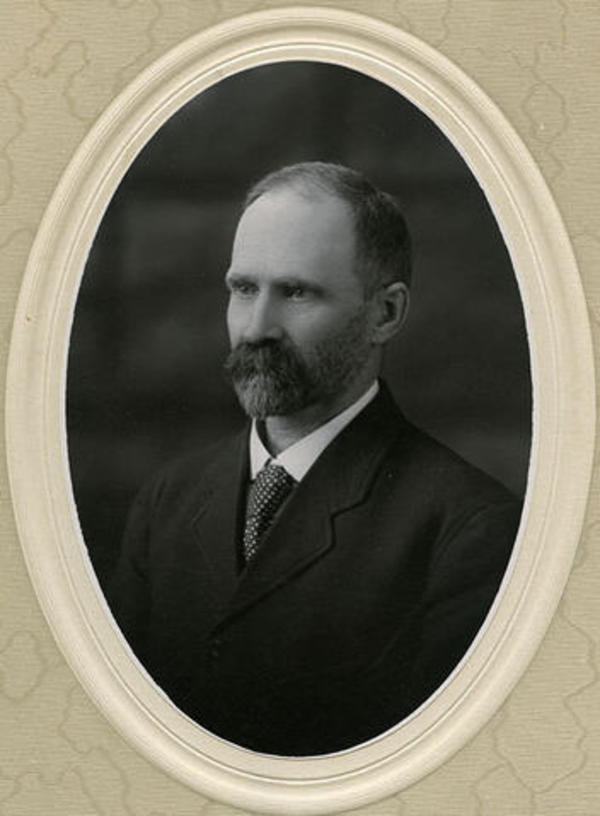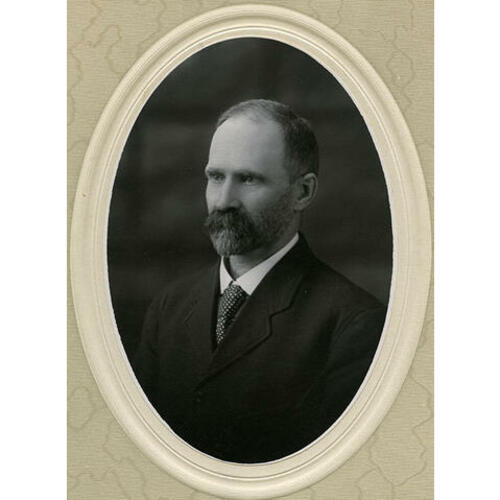
Source: Link
WILLING, THOMAS NATHANIEL, farmer, naturalist, office holder, and educator; b. 1858 in Toronto, son of Thomas Willing and Jessie Gillespie; m. 1895 Victoria E. M. Evans of Montreal, and they had two sons; d. 30 Nov. 1920 in Saskatoon.
Thomas Willing was educated in Toronto at the Model Grammar School, where he showed a deep interest in natural history. In 1880 he joined a Canadian Pacific Railway survey crew and worked his way westwards to Winnipeg. The next year he was hired by the CPR to evaluate the agricultural potential of its prairie lands, a job that he was to combine with work as a freighter. Entranced by the west, Willing left the employ of the railway in 1883 and began ranching in the foothills near Calgary. He remained there until 1895, when he moved to a farm in the vicinity of Olds.
During his first years in the west, Willing became aware of the great diversity of prairie plants and the economic losses incurred by farmers who did not control noxious weeds and insects. At the same time, as a rancher and farmer, he gained practical experience in insect and weed control. With the encouragement of William Terrill Macoun of the federal Department of Agriculture, and also of dominion entomologist and botanist James Fletcher*, Willing studied a variety of plants and insects and built up large collections of both. Indeed, he was to continue collecting throughout his life, and a number of institutions benefited from his labours, including the herbarium of the University of Saskatchewan, the Territorial Museum (forerunner of the Saskatchewan Museum of Natural History in Regina), and, in Ottawa, the National Herbarium of Canada and the Canadian National Collection of Insects. Never short of energy, Willing was also a founding member in 1898 of the North-West (Canada) Entomological Society and served as its secretary-treasurer until 1901. Afterwards, he filled the same post in this organization’s successor, the Territorial Natural History Society (now the Alberta Natural History Society).
Willing’s knowledge of weeds worked to his personal advantage in the late 1890s. The North-West Territories passed legislation in 1896 authorizing the creation of noxious-weed districts and the appointment of inspectors, and the following year Willing became weed inspector in the Olds-Lacombe area. He performed so impressively in this post that in 1899 he was made chief weed inspector for the entire territories. The appointment was initially a temporary one but was made permanent the next year, whereupon Willing sold his Olds farm and moved to Regina.
As chief weed inspector, Willing had 40 men under his supervision. He travelled constantly, by train, by wagon, and on foot, berating some farmers, cajoling others, and instructing all in the practice of weed control. He also acted unofficially as a pest-control specialist. In this regard, Willing advocated biological rather than chemical control, regarding arsenicals as the measure of last resort. On one occasion, he suggested to people in the North Battleford area that they drive beetles away by walking across the field and beating the vegetation with sticks. After the creation of Saskatchewan in 1905, Willing continued on as the new province’s chief weed inspector and also served as chief game guardian.
In 1911 Willing left government to take up a post as professor of natural history at the newly founded University of Saskatchewan, a move that further underlined his achievements as an entirely self-educated scientist. Attached to the college of agriculture, Willing offered his students instruction in weed and insect identification as well as pest control and plant diseases, and he also gave lectures on farming practices. Although he published little – a checklist of the common plants of Saskatchewan, started in 1913, was never completed – he was a popular and able teacher, skilled both at imparting knowledge and at instilling in his students a fascination with the natural world.
Willing’s death in 1920 was a great loss to the University of Saskatchewan, and to the province’s scientific community generally. His gift of close and exact observation, his retentive memory, his untiring zeal and questioning spirit, and his unrivalled knowledge of the fauna and flora of western Canada have placed him in a position of prominence among Canadian naturalists.
Thomas Nathaniel Willing is the author of “Weeds of the farm and ranch,” Sask., Dept. of Agriculture, Bull. (Regina), no.7 (1908); a second edition was published in 1911, and a third abridged edition appeared the following year.
NA, RG 17, AII, 2342: 679; 2343: 25. Univ. of Sask. Arch. (Saskatoon), RG 1, ser.1 (presidential papers, W. C. Murray), 34, file B.38/13 (departmental reports: biology), 1916/17: 17, 23; 1920/21: 13–14. Canadian men and women of the time (Morgan; 1912). N.W.T., Dept. of Agriculture, Annual report (Regina), 1899: 29. P. W. Riegert, “Entomologists of Saskatchewan,” Entomological societies of Canada and Saskatchewan, Miscellaneous Pub. (Ottawa), 1990; From arsenic to DDT: a history of entomology in western Canada (Toronto, 1980); “Thomas Nathaniel Willing, pioneer prairie naturalist,” Entomological Soc. of Canada, Bull. (Ottawa), 15 (1983): 127–30. Sask., Dept. of Agriculture, Annual report (Regina), 1906: 121. W. P. Thompson, The University of Saskatchewan: a personal history ([Saskatoon and Toronto], 1970).
Cite This Article
Paul W. Riegert, “WILLING, THOMAS NATHANIEL,” in Dictionary of Canadian Biography, vol. 14, University of Toronto/Université Laval, 2003–, accessed December 17, 2025, https://www.biographi.ca/en/bio/willing_thomas_nathaniel_14E.html.
The citation above shows the format for footnotes and endnotes according to the Chicago manual of style (16th edition). Information to be used in other citation formats:
| Permalink: | https://www.biographi.ca/en/bio/willing_thomas_nathaniel_14E.html |
| Author of Article: | Paul W. Riegert |
| Title of Article: | WILLING, THOMAS NATHANIEL |
| Publication Name: | Dictionary of Canadian Biography, vol. 14 |
| Publisher: | University of Toronto/Université Laval |
| Year of publication: | 1998 |
| Year of revision: | 1998 |
| Access Date: | December 17, 2025 |



